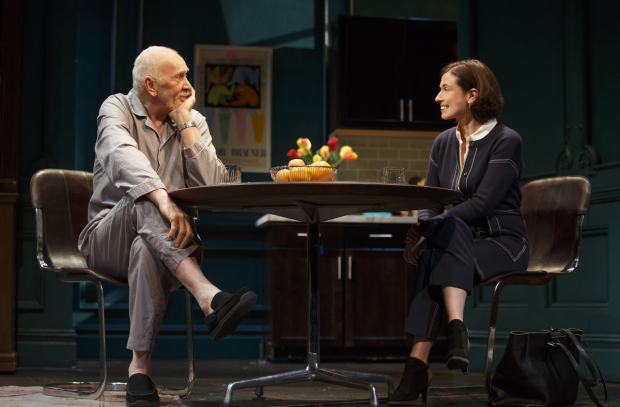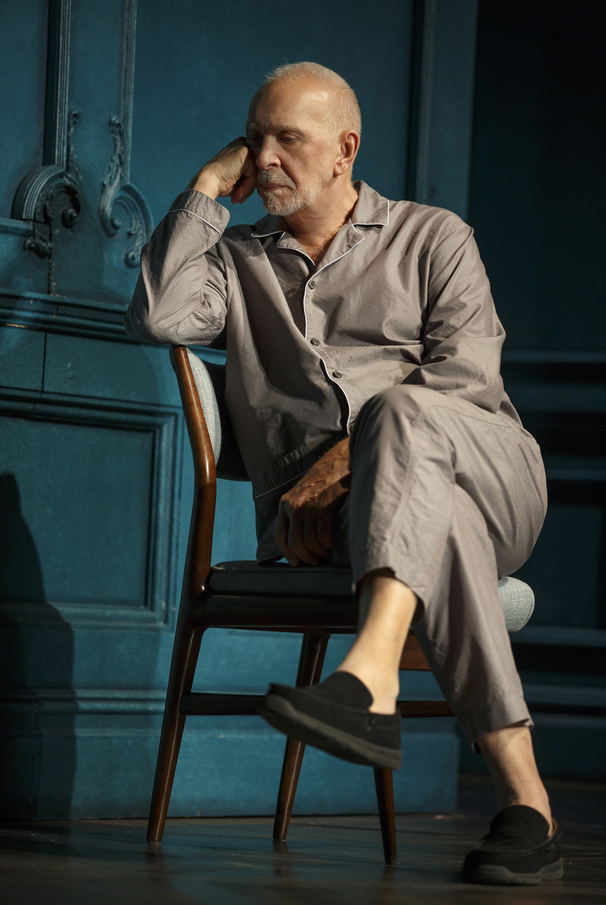Frank Langella is an imposing figure. Standing 6'4" tall, with a countenance absolutely befitting a man who has played both Dracula and Richard Nixon, the man simply looks like a force to be reckoned with. His sense of gravitas demands attention and respect. All of which makes what he does in Manhattan Theater Club's Tony-nominated production of Florian Zeller's play The Father even more impressive.

Langella plays André, an elderly man living in Paris with his daughter, Anne (Kathryn Erbe). At the start of the play, Anne is explaining why she has to get him a new helper: The last one apparently quit after André called her "a little bitch" and threatened her with a curtain rod. For his part, André at first denies the incident, then laughs it off, saying that he is perfectly competent to care for himself.
And here is where talking about the play gets difficult...
I went into The Father almost completely blind, knowing nothing other than that it was adapted by the great Christopher Hampton from an award-winning French play. So my experience of it was one of complete awe and wonder at the play's structure and the flat-out brilliant staging by Doug Hughes. If you would prefer to go in unspoiled - and I recommend you do, if only to experience the full emotional impact of the play and Langella's monumental performance - you can stop here. I will only say that The Father is one of the simplest, smartest productions I have seen on a Broadway stage, and also one of the most impactful. By the end of the play's 90 minutes, I realized that I had been holding my breath for most of it, dumbstruck by how thoroughly the production had put me in the protagonist's shoes.
SPOILERS AHEAD
The Father consists of fifteen scenes, each ending in a bright flash of light, followed by some lights flashing around the proscenium to some music. At first, this is a confusing choice. But then, slowly, the play's true nature makes itself clear. In the play's second scene, we see a completely different woman claiming to be Anne, and it's impossible to tell if this is an attempt to gaslight André or not. And then after a couple more scenes, it becomes clear that things have gone missing from the set - a painting here, a chair there - and we realize the awful truth: André is suffering from dementia, and we are strapped in for the ride right alongside him. Those flashing lights? A way to hide the ingenious set changes, yes, but also representing the connections in the brain, and reminiscent of the miniature strokes that are the most common cause of vascular dementia.
 Until you realize the gambit Zeller and Hughes have taken, The Father is a pretty great thriller: Why does Anne's look and story keep changing? Who is this strange man showing up and slapping André? Are people stealing things from the apartment? And just whose apartment is this anyway, Anne's or André's? Once you do realize what's going on, the play turns into a great tragedy of Shakespearean proportions. The ending has already been written. That heartbreaking final tableau was inevitable from the start, the only place the story could ever end.
Until you realize the gambit Zeller and Hughes have taken, The Father is a pretty great thriller: Why does Anne's look and story keep changing? Who is this strange man showing up and slapping André? Are people stealing things from the apartment? And just whose apartment is this anyway, Anne's or André's? Once you do realize what's going on, the play turns into a great tragedy of Shakespearean proportions. The ending has already been written. That heartbreaking final tableau was inevitable from the start, the only place the story could ever end.
While Hughes's staging (and Donald Holder's lighting) are clever and impactful, what really pulls the production together is Langella's performance. To watch a man this strapping, this charming, this alive deteriorate from the inside out is a terrible, difficult thing to watch, and even more difficult to perform. But somehow, Langella does it: By the end of the play, he looks completely hollowed out - the spring in his step gone, the light in his eyes extinguished, even the lines on his face seem deeper. He ages years in front of you in less than two hours. It's a marvel of a performance, one that I cannot possibly imagine putting myself through eight times a week. Langella may be the only cast member to receive a Tony nomination, but the rest of the ensemble is pretty great, too. Erbe brings a simultaneous air of resignation and deep affection to Anne, totally believable as someone who has been put through the ringer and forced to make impossible decisions about a family member with whom she has a complicated history. Hannah Cabell, as André's eventual helper, is a source of light. Brian Avers, Charles Boland, and Kathleen McNenny have the difficult jobs of playing roles that are purposefully not well-defined, but they provide precisely the support the play needs in order to work its magic.
And yes, The Father is indeed a magic act. It's a very tall order to put an entire audience completely into the headspace of a person, much less almost directly inside their mind as this production accomplishes. While watching the early scenes, I was confused, disoriented, unsure of myself and what I was seeing. Once I realized what was going on, I could only watch in horror as this great man crumbled before me onstage. It's a trick a playwright can only pull once, if they're lucky, but the skill with which Zeller (by way of Hampton) and Hughes pull it is impressive, and pays dividends whether you know about it before the lights go down or not. The Father is more than a play: It is a truly stunning total experience.

Related: Tony Award Nominations